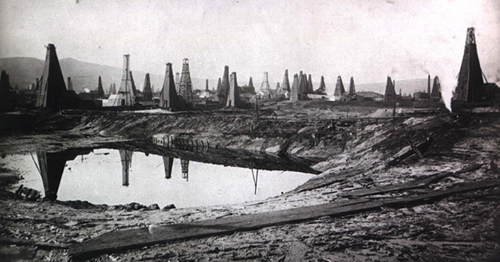Baku
From Kaiserreich
Baku is the capital, the largest city, and the largest port of Azerbaijan.
History
The first written evidence for Baku is around 6th century AD when historian Priscus of Panium mentioned "the famous Bakuvian fires" (ex petra maritima flamma ardet – from the maritime stone flame emerges). Owing to these eternal fires Baku became a major center of ancient Zoroastrianism.
For the most part of its old history this area has been part of different Persian Empires; the city became important after an earthquake destroyed Shamakhy and in the 12th century ruling Shirvanshah Ahsitan I made Baku the new capital. Marco Polo wrote of Baku oil exports to Near Eastern countries and Italian merchants' ships from Genoa and Venice traded at the city's port. The city also traded with the Golden Horde, the Moscow Princedom and other European countries. In 1501, Safavid Shah Ismail I laid a siege on Baku, but at this time the city was enclosed by strong walls, which were washed by sea on one side and protected by a wide trench on land on the other. In 1540 Baku was again captured by the Safavid troops and in 1604 the Baku fortress was destroyed by Persian shah Abbas I.
On June 26 1723, after a lasting siege using cannons, Baku surrendered to the Russians, but in 1795 it was conquered back by Agha Muhammad Khan Qajar. In the spring of 1796 by Yekaterina II's order Russian troops started a large campaign in Transcaucasia: Baku immediately surrendered and on June 13 1796 the Russian flotilla entered the Baku bay and a garrison of Russian troops was placed in the city. In March 1797 the tsarist troops left Baku but in 1813 Russia signed the Treaty of Gulistan with Persia, which provided for the cession of Baku and most of the Caucasus from Persia and their annexation by Russia. On July 10 1840, the Russian Duma approved "The Principles of Ruling of the Transcaucasian Region" and Baku was officially turned into an administrative region of the Russian Empire.
On May 28 1918 the independent Democratic Republic of Azerbaijan was proclaimed in Ganja. Shortly after, Azerbaijani forces, with support of the Ottoman Army, started their advance onto Baku, eventually capturing the city from a loose coalition of Bolsheviks, Esers, Dashnaks, Mensheviks and the British forces under the command of General Dunsterville on September 15 1918. A few days later Baku became the new capital of Azerbaijan.
During the Weltkrieg the city was occupied by various forces (Ottomans, British, even Boslheviks) and it was partially destroyed. However at the end of the war the city was quickly rebuilt thanks to foreign investments in the exploitation of the vast Baku oil fields.
Baku Oil Fields
|
In 1823 the world's first paraffin factory was built in the city and in 1846 the world's first oil well was drilled in Bibi-Heybat, a suburb of Baku. However, the large-scale oil development started only in 1872, when the Russian imperial authorities auctioned the parcels of oil-rich land around Baku to private investors. Within a short period of time Swiss, British, French, Belgian, German, Swedish and American investors appeared in Baku and the industrial oil belt, better known as Black City, was established. By the beginning of the 20th century almost a quarter of the oil reserves in the world were extracted in Baku and this contributed to the massive growth of Baku whose population between 1856 and 1910 grew at a faster rate than that of London, Paris or New York.
After the Weltkrieg, the Azerbaijani government increased the exploitation of the oil fields by attracting foreign investments, in order to find the resources to rebuild the country devastated by the war. This process was pushed even further since Suleyman Rustam became Prime Minister of Azerbaijan in 1934.

